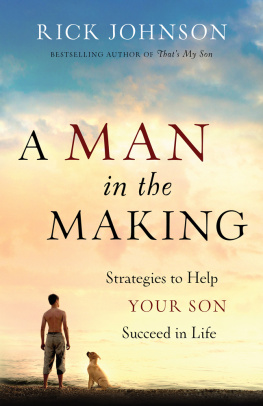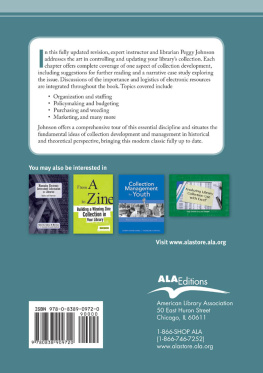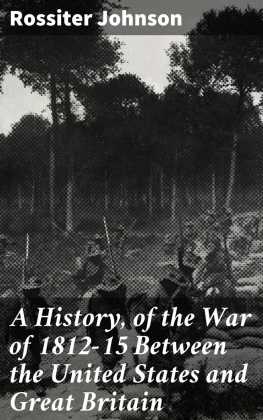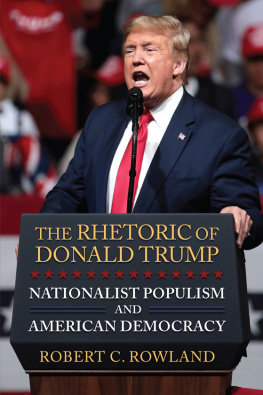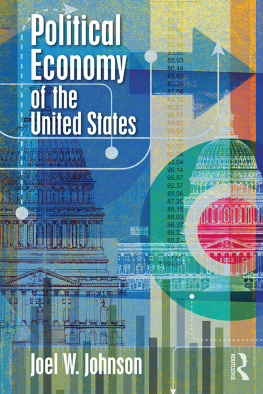Johnson - I the People: The Rhetoric of Conservative Populism in the United States
Here you can read online Johnson - I the People: The Rhetoric of Conservative Populism in the United States full text of the book (entire story) in english for free. Download pdf and epub, get meaning, cover and reviews about this ebook. year: 2022, publisher: University of Alabama Press, genre: Politics. Description of the work, (preface) as well as reviews are available. Best literature library LitArk.com created for fans of good reading and offers a wide selection of genres:
Romance novel
Science fiction
Adventure
Detective
Science
History
Home and family
Prose
Art
Politics
Computer
Non-fiction
Religion
Business
Children
Humor
Choose a favorite category and find really read worthwhile books. Enjoy immersion in the world of imagination, feel the emotions of the characters or learn something new for yourself, make an fascinating discovery.

- Book:I the People: The Rhetoric of Conservative Populism in the United States
- Author:
- Publisher:University of Alabama Press
- Genre:
- Year:2022
- Rating:4 / 5
- Favourites:Add to favourites
- Your mark:
- 80
- 1
- 2
- 3
- 4
- 5
I the People: The Rhetoric of Conservative Populism in the United States: summary, description and annotation
We offer to read an annotation, description, summary or preface (depends on what the author of the book "I the People: The Rhetoric of Conservative Populism in the United States" wrote himself). If you haven't found the necessary information about the book — write in the comments, we will try to find it.
I the People: The Rhetoric of Conservative Populism in the United States — read online for free the complete book (whole text) full work
Below is the text of the book, divided by pages. System saving the place of the last page read, allows you to conveniently read the book "I the People: The Rhetoric of Conservative Populism in the United States" online for free, without having to search again every time where you left off. Put a bookmark, and you can go to the page where you finished reading at any time.
Font size:
Interval:
Bookmark:
I THE PEOPLE
SERIES EDITOR
John Louis Lucaites
EDITORIAL BOARD
Jeffrey A. Bennett
Carole Blair
Joshua Gunn
Robert Hariman
Debra Hawhee
Claire Sisco King
Steven Mailloux
Raymie E. McKerrow
Toby Miller
Phaedra C. Pezzullo
Austin Sarat
Janet Staiger
Barbie Zelizer
The Rhetoric of Conservative Populism in the United States
PAUL ELLIOTT JOHNSON
THE UNIVERSITY OF ALABAMA PRESS
Tuscaloosa
The University of Alabama Press
Tuscaloosa, Alabama 35487-0380
uapress.ua.edu
Copyright 2022 by the University of Alabama Press
All rights reserved.
Inquiries about reproducing material from this work should be addressed to the University of Alabama Press.
Typeface: Adobe Garamond
Cover design: Lori Lynch
Cataloging-in-Publication data is available from the Library of Congress.
ISBN: 978-0-8173-2109-3
E-ISBN: 978-0-8173-9380-9
For Alan Coverstone and Amber Kelsie, who, together, redeem my world daily even when it doesnt deserve it.
FIRST AND FOREMOST , I HAVE to acknowledge all those family who passed away in the six years that I worked on this project. Cathy Bruce, Eric Johnson, Esther Oriol, Scott Nelms, and Pat Elliott were all very dear to me, and I miss them all. To various degrees, some of them would have pretended not to understand exactly what I was doing while giving their unconditional love.
Second, I have to acknowledge the talented surgical team at the University of Pittsburgh Medical Center in Oakland. One spring morning in 2016, after working on the book at my local coffeeshop, I set off on my way to get some lunch. One speedily and illegally taken left turn later, I had been flipped over a sedan and landed on the hard pavement, my right arm smashed by the car. Luckily, a random guy walking down the street was an EMT, and he stayed with me while we waited for an ambulance. The incredible capable and professional trauma surgery team that helped me that dayalong with the amazing rehabilitation staff at the UPMC rehab center in Oakland that helped me exercise twice a day for almost a whole yearhelped make this project possible in a most basic sense.
Third, my family members are incredible people. My dad, Kirk, and my mom, Libby, have both been so supportive of me and my career. My sisters, Laura and Stephanie, have been similarly supportive and encouraging, and I love them all so much, along with my grandmas, Arlene and Mimi.
I owe an incredible amount of thanks to Kimberly Singletary at Humanities First! Her work as a developmental copyeditor helped turn this project from a set of stark ravings into a more coherent and legible enterprise. Kims expertise in rhetoric, theories of Blackness, and American identity helped shape this project into something more textured, transforming it into a manuscript that does a better job of putting creditand blamewhere they are due in assessing the state of play in the politics of the United States and its social order.
Dan Waterman at the University of Alabama Press has been great to work with. From talking through the finer points of preparing a manuscript, to giving feedback on the project at various stages, to finding reviewers well-positioned to comment upon and improve the book, I have nothing but excellent things to say about my experience with the University of Alabama Press. On the production side, Joanna Jacobs kept things moving, while the copyediting of Irina du Quenoy has been a gift, one desperately needed.
We have an amazing group of scholars from different departments who are part of a writing group here at Pitt, and I would never have finished the book without them. Twice a week weall as junior facultywould gather together and write. Jules Gill-Peterson, Peter Odell Campbell, Imani Owens, Elizabeth Rodriguez-Fielder, and Patrick McKelvey: every day some of us would be writing. They are all lovely, amazing friends. I have to reserve a couple special words for Peter, who has listened to just about every rant about this book I could imagine, whether at the coffeeshop at a reasonable hour or at the bar across the street from the coffeeshop at a... less reasonable hour. Further shout outs to others who show up sometimes and brighten the day, including Shaun Myers, Dave Molina, and Khirsten Scott.
The proprietors of Constellation Coffee in Pittsburgh, Amy and Cliff, deserve a thanks. Its possible I wrote the bulk of this project in their space. And they let me hang out there whenever I lost my keys, like a stereotype of a professor. The coffee is great!
The graduate students at Pitt have helped me think through many key questions about rhetoric, violence, sovereignty, and US identity. Between the opportunities to teach seminars on rhetorical theory, populism, and sovereignty, I was able to work through a lot of these ideas in conversation with a wildly talented group of emerging scholars, both in class and at department events. Charles Athanasopoulos, Corinne Sugino, Robin Zwier, Kory Riemensperger, Elise Homan, Deborah Danuser, Andrew Allsup, Kelly ODonnell, Al Primack, Sierra Abram, Kam Dadah, Rachel Clancy, Alex Holguin, Reed Van Schenk, Kaitlyn Haynal, Sam Allen, Daniel Beresheim, Sarah Constant, Jess Benham, Logan Blizzard, Ambrose Curtis, and Andrea Hannah all shared trenchant insights, pushed our thinking, and in general provided a model learning experience. An informal reading group on sovereignty with Niq. D. Johnson was also invaluable for shaping my thinking on many questions about authority and power.
I especially want to thank E. Chebrolu and Sydney Pasquinelli. Having worked with E. first in my capacity as a collegiate debate coach and then later together in the context of the Department of Communication at Pitt, I have learned so much by conversing with him about our shared research interests, even if some days the topics of our discussions really do read like the shipping manifest of the Voyage of the Damned studying some of the worst parts of our hellscape. He has really pressed me to be a great scholar and a better person, and Im proud of how much work he does to insist that the world be a better place. Sydney, you are an incredible friend and working closely with you for several years coaching was great. Thanks for giving me room to grow.
Talking shop is one of the most important parts of a project like this. Im blessed with an amazing group of friends and scholars. Jason Regnier, Sean Kennedy, Joel Lemuel, Joe Packer, Jessica Kurr, Taylor Hahn are only a few of many people who tolerated rants and raves and lengthy exegeses that appeared to have no end. A note also to Maddie Denison, whose keen observations as a debater and student have helped inform a lot of what I hope this book is able to illuminate. Finally, to Ron von Burg and Alessandra Beasley von Burg, who have tolerated me since way back when: your friendship and intellectual grace mean the world to me.
I have so many warm thoughts for people who were willing to read parts of this manuscript. Michael Mario Albrecht and Atilla Hallsby probably read almost the whole thing in various parts, and their comments and insights were keen and helpful. Olga Kuchinskaya and David Marshall, my colleagues at Pitt, gave incredibly helpful comments on the introduction, and both offered helpful advice for seeing the project to completion. Michael Goodhart, Tamar Malloy, Rafael Khachaturian, Rachel McKinney, Andrew Lotz, and other members of the Pittsburgh political theory reading group provided many useful comments and conversations. Other folks around campus, including Kris Kanthak and Dan Kubis, provided useful feedback on the project. Thanks to the
Font size:
Interval:
Bookmark:
Similar books «I the People: The Rhetoric of Conservative Populism in the United States»
Look at similar books to I the People: The Rhetoric of Conservative Populism in the United States. We have selected literature similar in name and meaning in the hope of providing readers with more options to find new, interesting, not yet read works.
Discussion, reviews of the book I the People: The Rhetoric of Conservative Populism in the United States and just readers' own opinions. Leave your comments, write what you think about the work, its meaning or the main characters. Specify what exactly you liked and what you didn't like, and why you think so.



